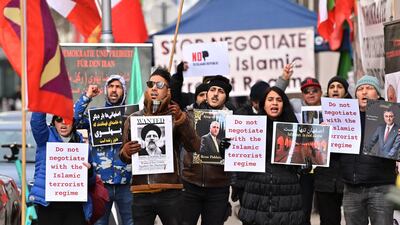The seventh round of talks between Iran and the five permanent UN Security Council members, plus Germany, was due to begin in the Austrian capital of Vienna next week, with the purpose of returning to the 2015 nuclear deal. That seems unlikely anytime soon, after the European countries involved in the preliminary discussions in Vienna voiced their “disappointment and concern” over differences with Tehran.
Shortly after the negotiations closed out for the week late on Friday, US Secretary of State Antony Blinken said Iran “does not seem serious” about returning to the JCPOA, as the deal is known. A team from Washington that had been indirectly negotiating with Iran left Vienna with no commitment to return.
There are two key differences yet to be resolved.
One concerns the control mechanism to monitor Iran’s nuclear activities. While Tehran says that this mechanism should remain under the supervision of the International Atomic Energy Agency (IAEA), the administration of US President Joe Biden wants to play a direct role in it. The second point of contention pertains to sanctions: Tehran wants an automatic lifting of US-led sanctions when an agreement is reached, while Washington has so far only committed to a step-by-step process.
It seems that the European parties, including France, Germany and the UK, tried convincing Washington to make concessions on both counts. After all, the so-called “E3” countries have been determined to ensure that their collective security interest, as well as economic interests, are assured by way of engaging productively with Iran. Other countries also keen to get the agreement done and dusted include China and Russia, considered friendly with Tehran.
Last month, key Arab nations also threw their support behind the JCPOA’s revival after attaching clear conditions concerning their own security.
Israel, which considers Iran as an adversary, appears to be the only country that remains cool over the negotiations. But the Biden administration seems convinced that it can manage the potential fall-out of a new nuclear arrangement with Iran, by providing more guarantees to Israeli security. Also, stakeholders such as Russia believe that Iran’s dire economic situation makes it unlikely for the regime to engage in a conflict with Israel, at least in the short term.
Be that as it may, the IAEA earlier this week reported that Tehran has begun the process of enriching uranium to 20 per cent purity with advanced centrifuges at its Fordow site. This amounts to yet another breach of the deal the regime agreed to with world powers in 2015. Indeed, it has repeatedly violated the terms of the accord, enriching uranium well above the agreed upon limits and increasing its installation of advanced centrifuges, which allow Iran to enrich uranium at a faster pace.
These breaches have come in response to previous US president Donald Trump’s decision to pull his country out of JCPOA, citing Iran’s regional aggressions and controversial ballistic missiles programme.
Tehran’s continued non-compliance does raise questions about not just the future of the Vienna talks but the nuclear programme itself. Could Iran, one day, still end up becoming one of a handful of countries that managed to circumvent the Treaty on the Nuclear Non-Proliferation of Nuclear Weapons, known around the world as NPT? Will this complicate global efforts to stop other countries, including perhaps those in the Mena region, from seeking to develop nuclear arsenals of their own?

However, an equally pertinent question to ask is whether the Mena countries – whether they are Turkey or key Arab states – would even need to develop a nuclear bomb. If Tehran succeeds in its objective, its triumphalism will undoubtedly increase given its position as the only other nuclear power in the Middle East alongside Israel. But what will the regime do with the bomb? Is having it really that important or advantageous – or has today’s world moved past such unusable deterrents?
As things stand today, the Arab Gulf states have developed themselves into modern welfare states focused on their people’s well-being. This, to me, seems a bigger and more credible achievement, and the model for other countries to follow in the current era – particularly as they have also succeeded in maintaining their security and other interests. In fact, the Arab Gulf states don’t stand to lose strategically to Iran’s nuclear edge.
On the other hand, the so-called Islamic Republic has much to lose, as its acquisition of the bomb could implicate it in direct cyber wars and proxy wars with Israel at some point in the future, which could prove very costly to its own power. The Iranian regime’s challenges will be further complicated by continuing social decline, even as its neighbours prosper and catch up with developed nations.
In a way, remaining outside the nuclear club may be a good thing for the Arab world. Indeed, the vision for prosperity, development and modernisation – not regional bullying and nuclear dominance – is the language of the future. The best example of this type of thinking today is the UAE, which has invested in its people for the past 50 years. For, in doing so, it has bet on prosperity rather than investing in destruction.


